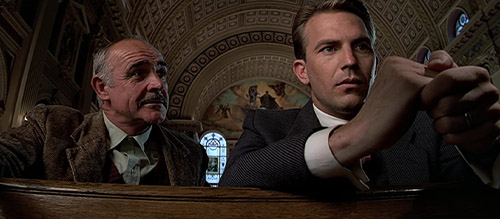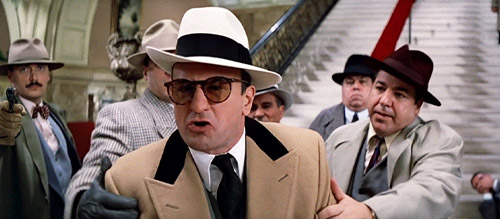The Untouchables (1987) Review
The Untouchables (1987)
Director: Brian De Palma
Screenwriter: David Mamet
Starring: Kevin Costner, Sean Connery, Andy Garcia, Robert De Niro, Charles Martin Smith, Patricia Clarkson
Brian De Palma has had an eclectic career spanning over 50 years and including iconic films such as the Stephen King classic Carrie, the epic gangster drama Scarface and the first entry in the Mission: Impossible series. The Untouchables, De Palma’s 1987 adaptation of the 1950s TV serial focusing on the efforts to bring down crime lord Al Capone, serves as a strong example of his versatility as a director and proof of how he wears his influences firmly on his sleeve. It is an impeccably acted ensemble piece that won Sean Connery an Oscar for Best Supporting Actor for his turn as no nonsense Jim Malone, a film that combines the old with the new for something uniquely De Palma and utterly rewatchable, even within a genre so often revisited.
While strongly received upon release, The Untouchables has perhaps gained more of a cult following in the years since and was a vehicle for launching the careers of several of its stars, most notably Kevin Costner and Andy Garcia. Vincent Canby in The New York Times described the gangster thriller as “a smashing work […] vulgar, violent, funny and sometimes breathtakingly beautiful”. While the majority of reviews were positive upon its release, the film was met with a degree of skepticism towards De Palma’s heavily influenced direction and the exposition-heavy screenplay provided by David Mamet.
We follow the efforts of Elliot Ness and his gang of Treasury officers in 1920s Chicago as they strive to prove that notorious mob boss Al Capone has links to the police force and the import and distribution of alcohol, which was banned at the time. David Mamet’s script can be a tad exposition heavy and does feature some clunky dialogue that feels very of its time, perhaps owing to the film having to cram a lot of detail and history into a 2 hour runtime (something the series was clearly never challenged by), but for the most part the cast manage to ensure this isn’t a persistent issue, keeping the train firmly on the tracks and ensuring an enjoyable experience.
Given that De Palma was adapting a Televison series (something he would of course try his hand at again with his adaption of the ‘Mission Impossible’ serial), there would have been an expectation to make the film as period accurate as possible. This is by far one of its biggest successes, the costume design and attention to period detail (perhaps not always on the details of the case) are immaculate, and it bears clear influence of Noir films from the 1940s, 50s and 60s. Yet, while clearly reverent of the works of Jean Luc Godard and Billy Wilder, as well as novelists like Raymond Chandler, The Untouchables clearly stands apart as its own work, and well and truly steps out of the shadow of its parent series.
The action sequences in The Untouchables are of the highest order (as one might expect from a Brian De Palma film), if perhaps on occasion a bit gratuitous in the levels of gore and violence. There are some particularly tense action scenes, notably the now famous stairwell sequence where Elliot Ness seeks out Capone’s bookkeeper. This sequence towards the denouement of the film is a clear nod to the Odessa Steps sequence in the classic film Battleship Potemkin, De Palma reworking the sequence to fit the narrative of The Untouchables as Ness grapples with Capone’s men, a pushchair perilously close to the centre of the action. It’s a moment that has become iconic, and has certainly become a highlight of De Palma’s storied career, the influence of the highly respected Soviet film being a key example of how filmmakers of De Palma’s era helped to revolutionise the American version of the form through tribute to lesser seen historical examples of international cinema.
The performances are a particular highlight of the film too, and alongside some noteworthy characterisation elevate The Untouchables above some other period crime films. Sean Connery gives one of his finest late career performances as Jim Malone, at first coming across as tough and uncompromising, but softening as the film progresses and eventually becoming a fully rounded individual. His old fashioned, uncompromising methods work well in contrast to Ness’s attitude and some of the other members of the crew, and Connery’s veteran status works in this regard to contrast the relative inexperience of his fellow leading man. In one of his breakout roles, Kevin Costner excels opposite Connery, showing lead protagonist Ness’s doggedness and determination to bring Capone to justice, as well as the toll his efforts have on his family. Costner and Connery are ably supported by the notable performance of Andy Garcia, but Robert De Niro’s pantomime-like Al Capone is one of the film’s weaker performances, his brief but cartoonish portrayal not doing any justice to such an iconic Chicago gangster. In watching the film some thirty plus years later, De Niro’s performance is perhaps even more badly received as we have seen more solid takes on this iconic figure in the years since, particularly Stephen Graham’s acclaimed turn in TV’s ‘Boardwalk Empire’.
A deserved special mention should be given to the late, great Ennio Morricone and his work on this film’s score. In arguably one of his more well-known compositions of the 1980s, Morricone blends traditional, orchestral film score influences with the synths that soundtracks in the 1980s seemed to lean towards, using this blend to not only gift The Untouchables an emotional core through music, but to mark the contrast between characters, with Capone and Ness receiving distinctly different soundtracks in each of their scenes. Morricone’s work, as always, functioned not only to brand the film with a recognisable and distinctive soundtrack, but to drive story and build tension, his genius in this regard worthy of celebration whether you come to enjoy the contents of The Untouchables or not.
The Untouchables does, then, represent a strong entry in director Brian De Palma’s varied body of work, even if it is at times slightly over the top. It is an impeccably acted film with some strong cinematography and a fine score from Ennio Morricone. It successfully updates its 50s source material and still feels timely over 30 years removed from its release. While obviously borrowing from previous crime and Noir works, it does enough with its subject matter to set itself apart in a genre that can at times feel easily imitated.
19/24



